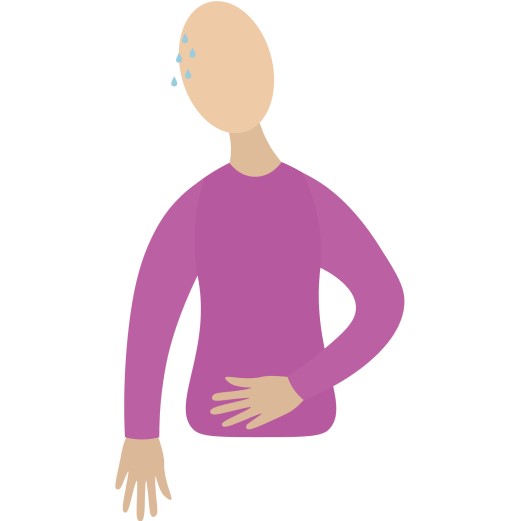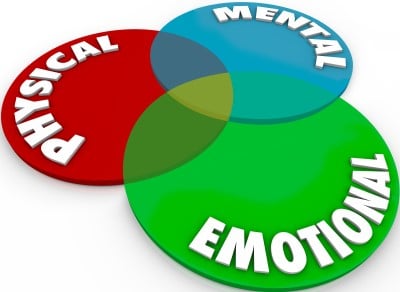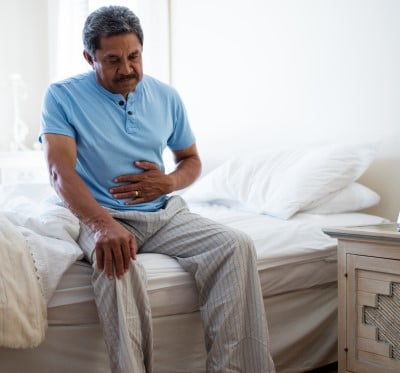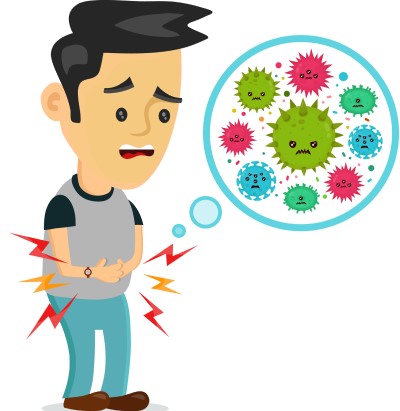
Can sleep apnea really cause IBS? – Why it might and 9 practical remedies
By Jason Wooden, PhD | September 12, 2022
Sleep apnea and IBS share common factors such as stress, anxiety, and inflammation. Early studies are showing a positive association in which patients with sleep apnea are more likely to have IBS than patients without sleep apnea. Fortunately, there are plenty of practical remedies you can try if you suspect sleep apnea is causing IBS.
In this article, we’ll talk about:
1) Why sleep apnea and IBS is double trouble
2) How they’re connected
3) Can sleep apnea REALLY cause IBS?
4) Can IBS cause sleep apnea?
5) Other IBS triggers to check for
6) 9 practical remedies
Sleep apnea and IBS, not so perfect together…
If you’re worried sleep apnea is somehow triggering IBS symptoms for you, I totally get it.
Sleep apnea by itself can be frustrating enough.
Waking up every hour throughout the night, frequent trips to the bathroom, complaints of loud snoring…
When morning finally comes you feel as if you haven’t slept at all, struggle with pounding headaches, and you spend the rest of the day as a sleep-deprived zombie.
Likewise, IBS by itself is no walk in the park.
First, there’s the unpredictable digestive tract whether it’s diarrhea from things moving too quickly or constipation from things moving too slow. Add to the mix bouts of pain and cramping, gas and bloating, embarrassing moments, and being stuck at home to be near a toilet.
Like I said, either one all by themselves is tough enough.
When you’re dealing with them at the same time, that can take things to a whole new level of frustration and add even more unpredictability to your life.

You’re certainly wouldn’t be the first to suspect that sleep apnea is causing IBS. After all, there’s around 1 billion people worldwide dealing with sleep apnea to varying degrees.
Depending on how severe your symptoms are, you’re possibly looking at twice the trouble and twice the misery.
It goes without saying anything that can trigger or worsen IBS symptoms needs to be taken seriously.
We’re going to take a look at what we know about the connection and what you can do about it.
Spoiler alert – there’s hope because there are plenty of practical things you can do to reclaim your nights and days from the scourge of sleep apnea.
The connection between sleep apnea IBS
It’s not so crazy as you think that sleep apnea could cause IBS.
At first glance they’re different beasts.
Sleep apnea is a condition in which your breathing is repeatedly interrupted during sleep. As you become more oxygen deprived, your brain arouses you out of deep sleep into a lighter sleep to resume breathing.
The loss of deep restorative sleep is why you wake up feeling as if you haven’t slept at all.
IBS is a condition in which there’s a problem with how the brain and gut work together. Because of this disconnect, you can get flare ups of abdominal pain and changes in bowel movement leading to diarrhea or constipation.
So, with one there’s something wrong with your airway and with the other it’s your gut.

However, sleep apnea and IBS overlap in some surprising ways:
Mind-body interactions
Your mind, brain, and body can interact in powerful ways that affect health and wellness. It turns out psychological stress and anxiety can trigger or worsen symptoms for both conditions.
People with obstructive sleep apnea, the most common type, often struggle with stress, anxiety, and depression. (These psychological issues are among the most common challenges for sleep in general).
Stress and anxiety can worsen the poor sleep of sleep apnea patients because it’s even harder to fall asleep, stay asleep, and they get even less deep sleep.
For IBS, psychological stress is also an important factor. In fact, there’s a strong correlation between the severity of IBS and mental health challenges such as anxiety or depression.
We all know from personal experience how sensitive your gut can be to stress and other emotions. For IBS patients, stress and anxiety triggers the release of hormones that affect the digestive track.
Excessive inflammation
Inflammation is the way your body mobilizes to fight infection and to help the healing process. When there’s too much inflammation in the body, it can actually be harmful.
Excessive inflammation can be a factor for both sleep apnea and IBS.
In studies, sleep apnea symptoms have been found to correlate with high levels of inflammation – the worse the sleep apnea is the more inflammation found in the body. Researchers are also finding that there’s excessive inflammation in the gut of IBS patients.
For both sleep apnea and IBS, ongoing psychological stress can trigger the release of hormones that keeps the levels of inflammation higher for prolonged periods.
While sleep apnea and IBS affect different parts of the body, they share common factors – stress, anxiety, and inflammation.
Can sleep apnea cause bowel problems and IBS?
Surprisingly, the link between sleep apnea and IBS hasn’t been well studied, so we don’t whether one can directly cause the other. (The reason this was a surprise is because IBS affects somewhere around 20% of the general population!)
So, what we got to go on is pretty limited.
There are anecdotal accounts from patients online in various forums and by doctors such as this one describing a patient with sleep apnea who also had IBS symptoms.
Based on the research done so far, there appears to be a positive association between sleep apnea an IBS.
A study of 256 patients referred to a sleep clinic found that IBS was prevalent among sleep apnea patients. In fact, as many as a third of them were experiencing IBS symptoms.
In another study involving 200 adults, patients who came into a sleep clinic for a sleep study were also screened for IBS. They found that patients who had sleep apnea were more likely to have IBS symptoms than those without sleep apnea.
If you’re curious how sleep apnea could trigger IBS symptoms, it’s certainly possible because of the overlap in factors.
As mentioned earlier, sleep apnea patients experience higher levels of stress, anxiety, inflammation, and sleep more poorly. All of these could trigger IBS symptoms in some people.

In fact, poor sleep has been correlated with both upper and lower digestive tract symptoms.
Nonetheless, early studies suggest that sleep apnea could cause IBS. More research is needed to figure out more exactly how it happens and why it happens for some but not all people.
Can IBS cause sleep apnea?
There’s even less research on this. Currently, there’s no evidence that IBS can affect your breathing and directly cause sleep apnea.
While IBS has been found to be prevalent among sleep apnea patients, researchers haven’t found any specific association between IBS and sleep apnea symptoms.
However, we do know that stress, anxiety, and poor sleep can make things harder for sleep apnea patients to get quality sleep.
So, if you’re having an IBS flare up and it’s stressing you out, it could cause people with sleep apnea to sleep even more poorly. Likewise, an unpredictable digestive track could make it harder to sleep.
Other things besides sleep apnea that can trigger IBS
Obviously, sleep apnea isn’t the only thing that could cause or worsen IBS symptoms. There are other causes you should consider.
Among the other things that could be triggering an IBS flareup for you are:
Stress
I’ve already mentioned how psychological stress is linked to IBS. Has something recently changed in your life?
Have you experienced an intensely stressful event or situation?
Mental health challenges
Many IBS patients also struggle with anxiety and depression. Psychological distress from ongoing psychiatric conditions can worsen IBS symptoms.
Food
Would you believe studies have found that specific foods can worsen symptoms for as many as 70% of people with IBS?
It could be a food intolerance in which your body is unable to digest foods such as dairy. It could also be a food allergy where your immune system over reacts to specific foods such as peanuts or seafood.
Bacterial changes in your gut
Researchers are learning a lot about how the balance of friendly and unhealthy bacteria in the gut can factor into IBS.
Among the changes linked to IBS are bacterial infections in the digestive tract and the overgrowth of bacteria in the small intestine.

Practical remedies worth a try if you suspect sleep apnea is causing IBS
Now we finally get to the good news.
If you’re worried that sleep apnea is triggering IBS symptoms for you, there’s plenty of practical things you can do. Some you can do on your own right away. Others may require more time and help from others.
Your options include:
1) Improving your sleep hygiene
Your everyday habits can make it easier or harder to get a good night’s sleep. Sleep is already tough enough with sleep apnea, so why make things harder than they have to be?
You need to be doing everything you can to fight the effects of sleep apnea on your sleep, body, and mental health.
For better sleep hygiene, you should:
- Wake up and go to bed at the same time every day
- Exercise
- Avoid large meals, alcohol, and stimulants such as caffeine before bedtime
- Maintain a bedtime routine
- Avoid electronics (TVs, tablets, smartphones) near bedtime
- Keep your bedroom dark, cool, quiet, & relaxing
2) Dietary changes
Starting paying more attention to what you eat. This is a good idea for both sleep apnea and IBS.
For starters, you want to avoid anything in the evening that can it harder to sleep such as spicy foods, caffeinated foods, sugary deserts, and alcohol. A low carb anti-inflammatory diet may also help since sleep apnea has been connected to inflammation.
It’s a good idea to start to keeping a diary of what foods you eat when you get IBS symptoms.
Your doctor and a nutritionist can help you figure out diet to support your health and recovery.
3) Stress management
Since stress is a factor for both sleep apnea and IBS, it’s important to start doing whatever you can to manage the stress in your life. It could be better self-care, improving your work-life balance, and managing expectations.
You can also fight stress with practices such as meditation, yoga, and tai chi. At night, relaxation exercises before bed can help aid the transition to sleep.
Learn more:
Stress Management (HelpGuide.org)
Six relaxation techniques to reduce stress
4) Exercise
Physical activity can be great for managing symptoms of both sleep apnea and IBS. Exercise is a natural mood booster that can relieve stress, fight inflammation, and promote a deeper sleep.
It can also aid digestion.
5) Mouth and throat exercises
Various exercises using your mouth and throat may help strengthen your airway and surrounding muscles. This can help the airway stay more open and improve sleep apnea symptoms.
Learn more:
Mouth And Throat Exercises to Help Stop Snoring and Improve OSA (sleepfoundation.org)
Video: Throat exercises for snoring and sleep apnea
6) Sleeping on your side
Did you know that over half of obstructive sleep apnea sufferers have symptoms that are “position-dependent”? Their symptoms are worse if they sleep on their back.
Sleeping on your side instead of your back can help keep your airway more open. Some people even claim that sleeping upright in a recliner helps.
7) Get a checkup
Do you really have both sleep apnea and IBS? If you don’t know for sure, you need to find out what you’re really up against.
A doctor can check for other underlying health issues linked to poor sleep, sleep apnea, and digestive disturbances.
8) Get your sleep apnea treated
If your sleep apnea is not under control, you need to do something sooner rather than later, especially if your symptoms are really serious.
Unfortunately, IBS isn’t the only health issue you may be dealing with. Untreated sleep apnea can increase your risk for serious life threatening health complications such as diabetes and heart failure.
Getting an official sleep diagnosis and treatment can get you on the road to recovery. I remember how much better I felt after my first night of CPAP therapy.
If you’ve tried CPAP and find it uncomfortable, there are now plenty of alternatives you can try.
9) Counseling
There’s a strong link between sleep, anxiety, and depression. You want to avoid getting into a vicious cycle where things slowly spiral more out of control.
If you find you’re feeling more anxious or more down than usual, it’s worth having a chat with a mental health specialist.

You may also be interested in:
IBS:
What to try if IBS has got you too depressed to sleep
What to try for IBS pain at night
8 reasons your IBS is worse at night and what to try
Can IBS cause you to sleepwalk?
Can CBD worsen IBS and insomnia?
Sleep apnea:
Does sleep apnea get worse over time?
Can sleep counseling help sleep apnea?
The Latest Sleep Apnea Devices and Treatment Options (A Complete List)
Yes, skinny women get sleep apnea too
9 Things to try to treat sleep apnea yourself
Sources:
1. Estimation of the global prevalence and burden of obstructive sleep apnoea: a literature-based analysis, Lancet Respir Med. 2019 Aug; 7(8): 687–698.
2. Irritable Bowel Syndrome (IBS), NIH website
3. Stress in obstructive sleep apnea. Scientific Reports volume 11, Article number: 12631 (2021)
4. Impact of psychological stress on irritable bowel syndrome. World J Gastroenterol. 2014 Oct 21; 20(39): 14126–14131.
5. How do stress and anxiety affect IBS?, 2022, Livi
6. Upper airway and systemic inflammation in obstructive sleep apnoea. European Respiratory Journal 2016 48: 1108-1117;
7. The role of inflammation in irritable bowel syndrome (IBS). J Inflamm Res. 2018; 11: 345–349.
8. Recent advances in the treatment of irritable bowel syndrome. Pol Arch Intern Med. 2021 Aug 30;131(7-8):709-715.
9. Association of irritable bowel syndrome and sleep apnea in patients referred to sleep laboratory. J Res Med Sci. 2017; 22: 72.
10. Irritable bowel syndrome in obstructive sleep apnea: a preliminary Egyptian study. Egypt J Bronchol 2017 11:379–385
11. GI DISORDERS AND SLEEP, comprehensivesleepcare.com
12. Anxiety and Depression in Irritable Bowel Syndrome. Indian J Psychol Med. 2017 Nov-Dec; 39(6): 741–745.
13. The Increased Level of Depression and Anxiety in Irritable Bowel Syndrome Patients Compared with Healthy Controls: Systematic Review and Meta-analysis. Journal of Neurogastroenterology and Motility 2017; 23(3): 349-362
14. Low-FODMAP Diet Improves Irritable Bowel Syndrome Symptoms: A Meta-Analysis. Nutrients. 2017 Sep; 9(9): 940.
Connect with us:
About Us
Better Sleep Simplified® was founded as a place for you to get clear and well-researched information.
Our goal is to make sure you know about your options so that you take action sooner rather than later.
Check us out on YouTube:
Watch and Learn
Helpful sleep tips, interesting sleep facts and statistics you want to know about
Affiliate Disclosure
This site is a participant in the Amazon Services LLC Associates Program and other affiliate advertising programs designed to provide a means for sites to earn advertising fees by advertising and linking to them.
Important: BetterSleepSimplified.com is for informational purposes only and is not intended or implied to be a substitute for professional medical advice, diagnosis, or treatment. Always consult a physician for sleep and health concerns. See additional information.
